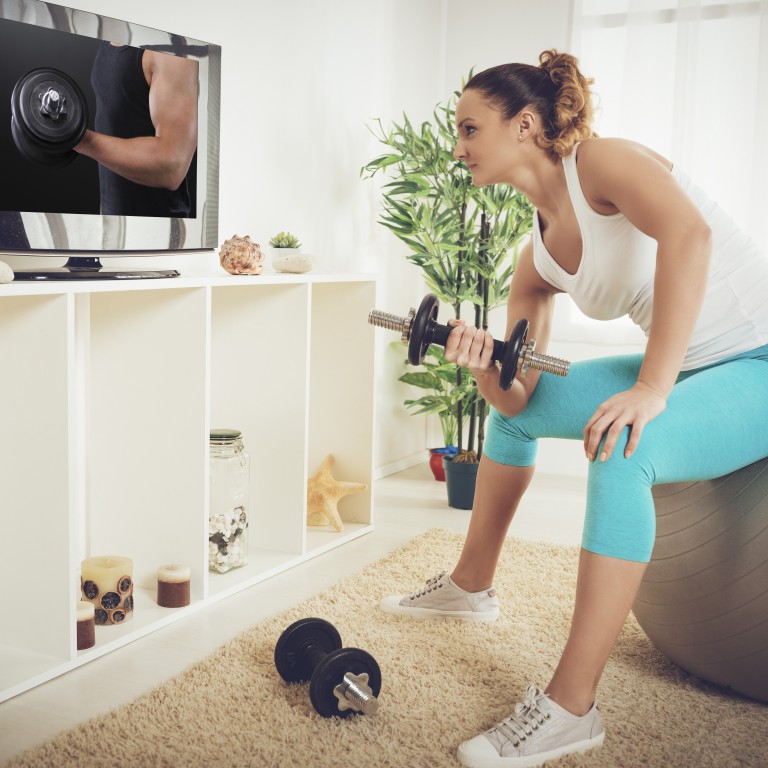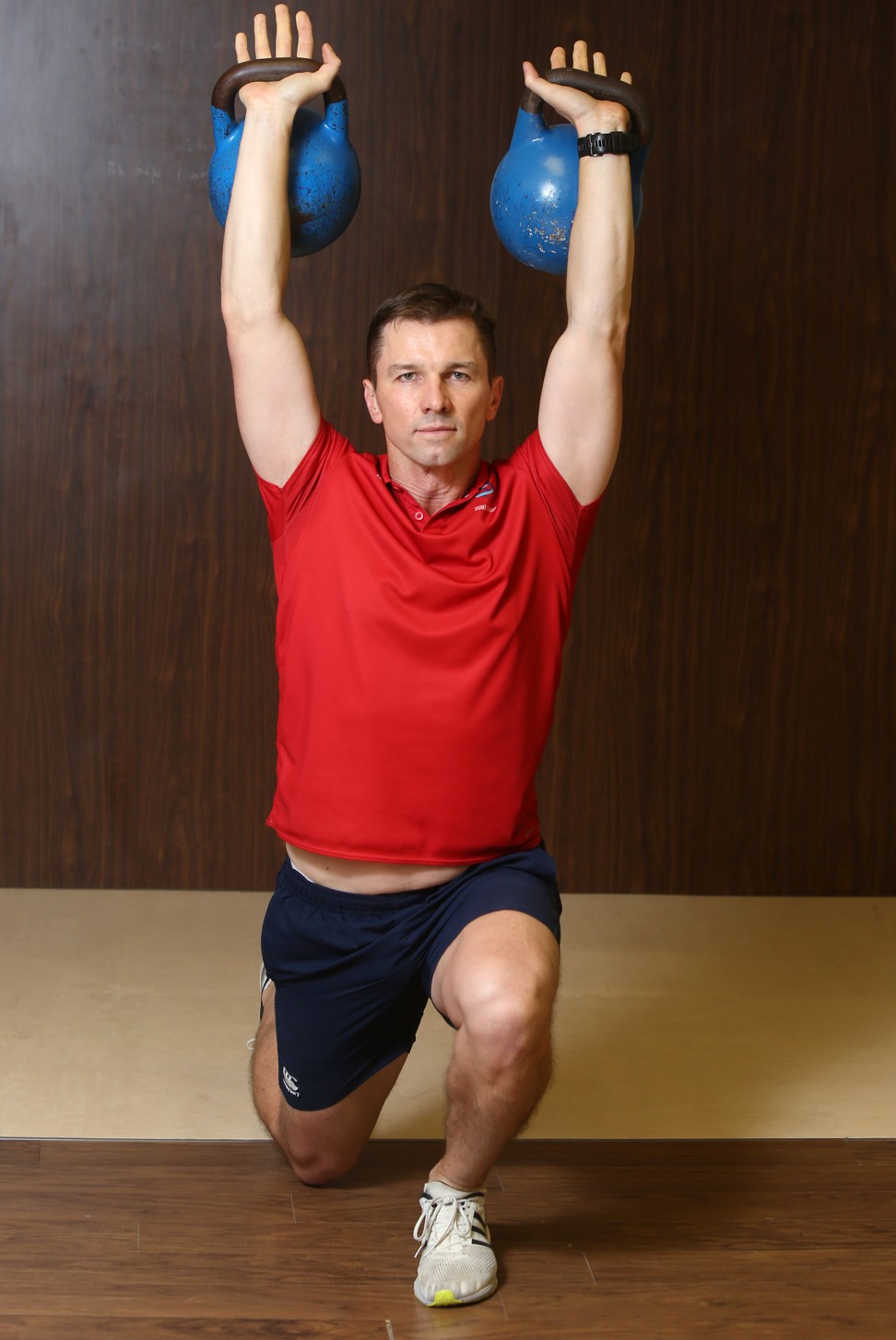
Coronavirus: how online fitness training can help you stay healthy and lose weight during home quarantine
- Gyms are using apps and conferencing platforms such as Zoom to offer real-time group or individual workouts for their members
- The service includes a weekly chat with trainers to check programmes and weight loss, and video libraries for demonstrations of exercises
The Covid-19 coronavirus pandemic isn’t stopping Gayle Higginbotham from exercising with her personal trainer as the formerly overweight Briton pursues her goal of trimming down to 57kg from her original weight of 105kg in 2018. She was down to 64kg when we spoke early in March.
The sales rep in the entertainment industry was homebound for work while in Hong Kong but continued to visit the gym at Joint Dynamics before she started using the organisation’s remote training service – Intelligent Movement On Demand (IMOD).
The online platform works with its TrueCoach app – to allow her to do workouts at home in Hong Kong or abroad. “Having exercise as an outlet gives me a break from being stir crazy at home,” says the 44-year-old.
Higginbotham recently spent two weeks working in London, where she continued to log in for her online sessions. “It’s a mental health saver,” she says. “My training supports me mentally to manage stress including the additional stress of the virus,” she says.

In the past, Higginbotham struggled to exercise and shed the weight due to back troubles. However, experts from Joint Dynamics, a fitness practice that provides personal training, sports therapy, physiotherapy and more, helped address her back issues first to get her in shape before starting an exercise regime to help her reach her goals.
“I lost, through training, 40 kilos over the last 18 months (and an additional .5kg while in London). Now exercise is very much part of my daily life,” she says. The online service helps her maintain continuity in training even while overseas. She does three online sessions a week guided by David Jacquier, a co-owner and director of Joint Dynamics.
How playing table tennis can help fight Parkinson’s disease
He prescribes exercise routines and videos delivered online. A recent session she did in her London hotel room involved 100 air squats, 40 negative push-ups (slowed-down push-ups), a series of ab routines and more. “I think [my trainer] was trying to kill me,” she laughs.
“In hotel rooms, if there is a gym … I send David videos of the equipment available. He designs a programme based on what’s available,” she says. If there is no on-site facility, he provides body-weight exercises.

Dr Leung Chi-chiu, a respiratory medicine specialist and chairman of the Hong Kong Medical Association’s advisory committee on communicable diseases, advises people to avoid unnecessary gatherings as much as possible to avoid passing the virus to others. “If one wants to do exercise, the safest place is to do it at home,” he says.
Online fitness services are expected to gain in popularity amid this new reality. Joint Dynamics introduced its service six months ago, well before the coronavirus outbreak. It aimed to meet demand from clients who travelled regularly or decided to stay offshore yet continue with their training, says Jacquier.
The service lets users opt for online sessions only or a mix of remote and in-person sessions. The tailor-made programmes and videos are delivered through the app. Coaches have access to about 1,000 pre-recorded instructional videos that they prescribe in a series of exercises for a client.

While the benefits of remote training are many, as Higginbotham shared, there are limits, too.
“You don’t have that person encouraging and pushing you to do the last four or five reps so you lose that motivation and accountability to a certain degree,” says Jacquier. Users must be disciplined and motivated to stick with this format.
Elite Personal Training Studio in Aberdeen, on the south side of Hong Kong Island, is also stepping forward to offer real-time group workouts on the Zoom conferencing platform. “This is the first time we’re doing this, it’s because of this [pandemic],” says managing director Nathan Solia. “How else can I get people to still work out yet make them feel safe and not feel like they will be affected [by the virus]?” he says.
The twice-a-day sessions from Monday to Friday are capped at four participants per class, with a coach guiding workouts to ensure movements are performed properly. As most people will not have the same equipment in the gym as they do at home, these sessions will be predominantly body weight exercises.
This offering aligns with Solia’s motto to “help Hongkongers stay strong” and maintain their exercise practices to build a stronger immune system – vital qualities people need right now.

Ultimate Performance (UP) Hong Kong, a fitness studio in Central with 16 facilities worldwide, has been offering online training for about 12 years. According to business development manager and senior trainer Daniel Dubois, its users are from around the world. They are people who tend to travel but find themselves without access to a gym in their new location, or clients that opt for a more affordable alternative to in-person training.
“With this online training, they can do it wherever they are and get to use our coaches at a cheaper rate and still get the same kind of results,” he says.

UP asks clients to record certain movement patterns for an assessment to create programmes that meet their specific needs and abilities.
Clients check in with their trainers weekly and have access to its video library to see demonstrations of exercises prescribed for them. A weekly check-in with the coach is essential, to provide details about their weight, steps, sleep and more.
On its website, UP founder Nick Mitchell says: “We should warn you that we expect a lot from our clients. We expect even more from our online clients. Our focus is absolutely unwavering and is not for everyone. We will do everything necessary to get results.”
Purchase the China AI Report 2020 brought to you by SCMP Research and enjoy a 20% discount (original price US$400). This 60-page all new intelligence report gives you first-hand insights and analysis into the latest industry developments and intelligence about China AI. Get exclusive access to our webinars for continuous learning, and interact with China AI executives in live Q&A. Offer valid until 31 March 2020.

